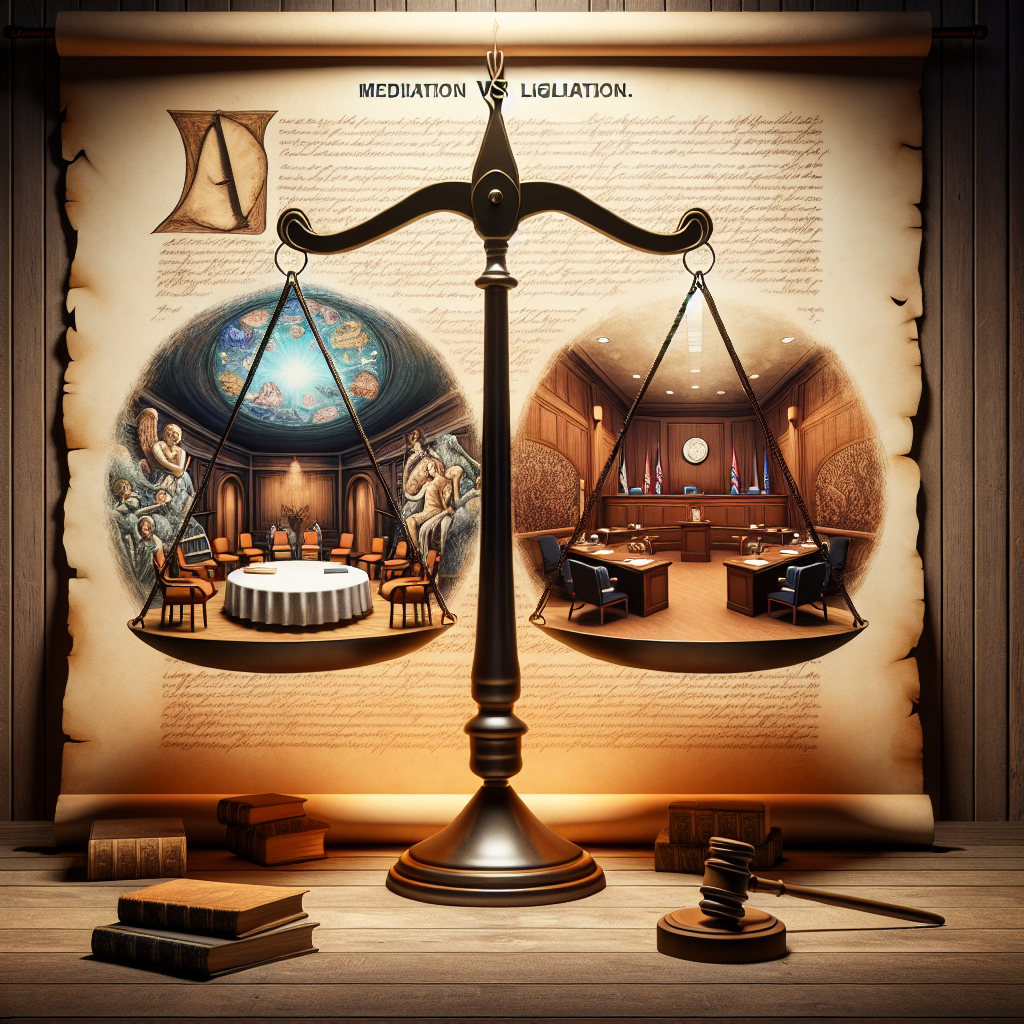In the complex world of legal disputes, choosing the right approach can feel overwhelming. Two of the most common methods to resolve conflicts are mediation and litigation. While both aim for a resolution, they offer distinct advantages and disadvantages. Understanding these differences can help you make a more informed choice about which path to pursue.
What is Mediation?
Mediation is a collaborative process where an impartial third-party mediator helps disputing parties to negotiate a mutually acceptable resolution. Unlike in litigation, the mediator does not make a judgment; instead, they facilitate communication and guide both sides toward finding common ground.
The Benefits of Mediation
-
Cost-Effective: Mediation is typically less expensive than litigation. It avoids many legal fees, court costs, and the lengthy processes typically associated with court battles.
-
Faster Resolutions: Mediation often leads to quicker outcomes since it doesn’t get bogged down in court schedules and delays.
-
Confidentiality: Mediation is private. Unlike court proceedings, which are open to the public, mediation discussions remain confidential, protecting both parties’ reputations.
- Preserves Relationships: Given its collaborative nature, mediation seeks to maintain amicable relations between parties. This is particularly beneficial in disputes involving family, neighbors, or business partners.
What is Litigation?
Litigation is the process of taking a dispute to court, where a judge (or jury) makes a binding decision based on the evidence and arguments presented by each side.
The Benefits of Litigation
-
Legal Precedent: Court decisions can set legal precedents, which can be beneficial for parties seeking to establish or challenge a specific legal claim.
-
Enforceability: A litigated outcome results in a legally binding judgment, which can be enforced through the legal system.
-
Public Record: For those interested in transparency or establishing a public record of the dispute, litigation offers an opportunity to present cases openly.
- Structured Process: Litigation provides a clear framework and rules of procedure, which can be advantageous for those who prefer a formal method of dispute resolution.
Weighing the Pros and Cons of Mediation and Litigation
Mediation Pros
- Increased control over the outcome
- Therapeutic approach fosters understanding
- Flexible solutions tailored to specific needs
Mediation Cons
- No guaranteed resolution; parties might still need to litigate
- Requires a willingness to cooperate and compromise
- May not be suitable for legal disputes that require precedent
Litigation Pros
- Final decisions that can uphold the law
- Representation by legal experts can strengthen your case
- Possibility of appeals in certain situations
Litigation Cons
- Higher costs due to legal fees and court expenses
- Lengthy and unpredictable timelines
- Potential for increased animosity between parties
Factors to Consider When Choosing
Complexity of the Dispute
For simpler disputes, mediation may be the more efficient option, allowing for a straightforward resolution. In contrast, complex legal matters involving multiple parties or significant legal issues may necessitate the structured approach of litigation.
Relationship Dynamics
If you wish to maintain a relationship with the other party—be it family, friends, or business partners—mediation could be the preferable route. Litigation often creates an adversarial atmosphere that can permanently damage relationships.
Need for Legal Precedence
If your case involves significant legal questions that may influence future litigation, litigation may be necessary to set a clear precedent.
Making the Right Choice
When deciding between mediation and litigation, carefully consider the nature of your dispute, your relationship with the other party, and the desired outcome. Each pathway offers its own unique advantages and challenges.
Before making your decision, consulting with a legal professional can provide personalized advice based on the specifics of your situation. They can guide you through the nuances of each option, helping you choose a path that aligns with your goals and best serves your interests.
Conclusion: Empowering Your Decision
In the end, both mediation and litigation have their roles in conflict resolution. Understanding their differences equips you to make a well-informed choice. By weighing the costs, speed, potential impact on relationships, and the need for legal clarity, you can select the path that best fits your circumstances. Whatever decision you reach, remember that the goal remains to resolve your dispute in a way that is fair and satisfactory, allowing you to move forward with your life.
Choosing to mediate or litigate can significantly impact the outcome of your dispute. Take the time to reflect on both options, consult with experienced professionals, and move forward with confidence on the path that suits you best.


